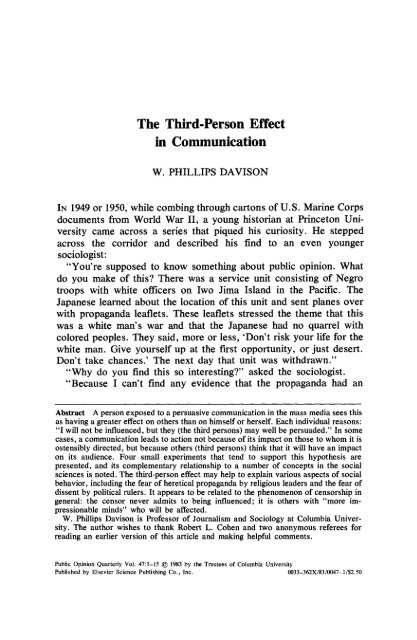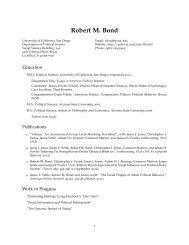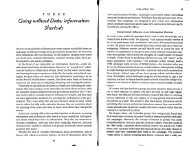The Third-Person Effect in Communication W. Phillips Davison The ...
The Third-Person Effect in Communication W. Phillips Davison The ...
The Third-Person Effect in Communication W. Phillips Davison The ...
Create successful ePaper yourself
Turn your PDF publications into a flip-book with our unique Google optimized e-Paper software.
<strong>The</strong> <strong>Third</strong>-<strong>Person</strong> <strong>Effect</strong><br />
<strong>in</strong> <strong>Communication</strong><br />
W. PHILLIPS DAVISON<br />
IN 1949 or 1950, while comb<strong>in</strong>g through cartons of U.S. Mar<strong>in</strong>e Corps<br />
documents from World War 11, a young historian at Pr<strong>in</strong>ceton Uni-<br />
versity came across a series that piqued his curiosity. He stepped<br />
across the corridor and described his f<strong>in</strong>d to an even younger<br />
sociologist:<br />
"You're supposed to know someth<strong>in</strong>g about public op<strong>in</strong>ion. What<br />
do you make of this? <strong>The</strong>re was a service unit consist<strong>in</strong>g of Negro<br />
troops with white officers on Iwo Jima Island <strong>in</strong> the Pacific. <strong>The</strong><br />
Japanese learned about the location of this unit and sent planes over<br />
with propaganda leaflets. <strong>The</strong>se leaflets stressed the theme that this<br />
was a white man's war and that the Japanese had no quarrel with<br />
colored peoples. <strong>The</strong>y said, more or less, 'Don't risk your life for the<br />
white man. Give yourself up at the first opportunity, or just desert.<br />
Don't take chances.' <strong>The</strong> next day that unit was withdrawn."<br />
"Why do you f<strong>in</strong>d this so <strong>in</strong>terest<strong>in</strong>g?'asked the sociologist.<br />
"Because I can't f<strong>in</strong>d any evidence that the propaganda had an<br />
Abstract A person exposed to a persuasive communication <strong>in</strong> the mass media sees this<br />
as hav<strong>in</strong>g a greater effect on others than on himself or herself. Each <strong>in</strong>dividual reasons:<br />
"I will not be <strong>in</strong>fluenced, but they (the thud persons) may well be persuaded." In some<br />
cases, a communication leads to action not because of its impact on those to whom it is<br />
ostensibly directed, but because others (third persons) th<strong>in</strong>k that it will have an impact<br />
on its audience. Four small experiments that tend to support this hypothesis are<br />
presented, and its complementary relationship to a number of concepts <strong>in</strong> the social<br />
sciences is noted. <strong>The</strong> thud-person effect may help to expla<strong>in</strong> various aspects of social<br />
behavior, <strong>in</strong>clud<strong>in</strong>g the fear of heretical propaganda by religious leaders and the fear of<br />
dissent by political rulers. It appears to be related to the phenomenon of censorship <strong>in</strong><br />
general: the censor never admits to be<strong>in</strong>g <strong>in</strong>fluenced; it is others with "more im-<br />
pressionable m<strong>in</strong>ds" who will be affected.<br />
W. <strong>Phillips</strong> <strong>Davison</strong> is Professor of Journalism and Sociology at Columbia Univer-<br />
sity. <strong>The</strong> author wishes to thank Robert L. Cohen and two anonymous referees for<br />
read<strong>in</strong>g an earlier version of this article and mak<strong>in</strong>g helpful comments.<br />
Public Op<strong>in</strong>ion Quarterly Val. 47:l-15 @ 1983 by the Trustees of Columbia University<br />
Published by Elsevier Science Publish<strong>in</strong>g Co., Inc. 0033-362X/83/0047-1/$2.50











